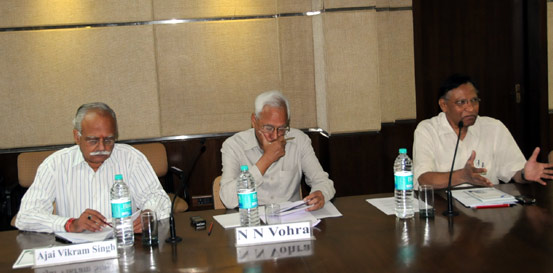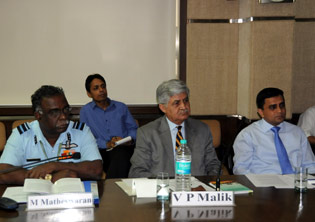
- This event has passed.
Defence Reforms, Civil-Military Relations and Military Effectiveness in India
May 30, 2011
Presided over by: His Excellency Shri NN Vohra, Governor of Jammu and Kashmir

A roundtable discussion was held on 30 May 2011 to discuss the two papers on the subject written by Anit Mukherjee, Research Fellow IDSA;
- Failing to Deliver: Post Crises Defence Reforms in India, 1998-2010,
- The Absent Dialogue: Civil-Military Relations and Military Effectiveness in India.
The round table began with the author presenting the main aspects of both of his papers. He began his presentation by arguing that this was not a ‘blame game’ and instead the underlying presumption of his research has been that officials, both civilian and military, are hard working, competent and patriotic. Despite this, the structure of civil-military relations has had an adverse impact on the effectiveness of Indian military. In making this argument, Anit described in considerable detail, the unique characteristics of civil-military relations in India and how they shape four determinants of military effectiveness—weapons procurement, jointness, defence planning and officer education and promotions policies. Acknowledging these problems, the government has tried time and again to push through defence reforms, however as Anit’s Occasional Paper argues, these have ‘failed to deliver.’ The author concluded by making two recommendations. First the need to declassify and allow a proper study of all our national security institutions. This will allow us to ‘know more’ and hence translate directly into better informed policies. Second, the need to establish a committee that can, after an exhaustive study, recommend measures to prepare the Indian defence forces for future threats, challenges and opportunities. Necessarily it will have to examine the interaction between politicians, bureaucrats and soldiers and suitably re-engineer the relations between Ministry of Defence, Service Headquarters and other National Security Agencies. 
Discussion Points
- There is a need to engineer an attitudinal shift towards national security and engage the people on some of these issues. However, such a shift can be engineered only if the service headquarters and the Ministry of Defence allow their files to be shared. Hence, it is very important to examine our past and bring out lessons from it.
- There was a debate on whether regulatory mechanisms exist for declassification. According to one participant, the Public Records Act of 1993 makes it incumbent upon the Service HQ to declassify its old records. However another participant observed that that there is no national policy on declassification that leaves the service headquarters grappling for direction. It was also pointed out that while the government has published war histories, the sources on which these accounts are written are themselves unavailable to the researchers.
- Some participants argued that before appointing a Chief of Defence Staff, there was a need to integrate Ministry of Defence with the Service Headquarters. Moreover, the Integrated Defence Staff does not currently have a mandate for operational control over the services. Hence there was a more compelling need to focus on higher defence management. However, another participant noted that there was a need to understand what this integration precisely translates into. It was pointed that in other countries, chiefs of armed forces are the chiefs of staff but in India they wear two hats—operational commanders and chiefs of staff. Does integration of Ministry of Defence envisage such a role? Is there also a concurrent need to establish the council systems that was envisaged but never implemented in 1955? However the same participants agreed that the generalist bureaucrat in the Ministry of Defence needs to be replaced perhaps by a cadre of trained security specialists that can rotate between different national security institutions.
- One participant argued that it was important to highlight the weaknesses that accrue from the current problematic form of civil-military relations. Hence consequences of not reforming should be spelt out clearly and the seriousness of the problem should be emphasized. For instance, recurring problems in jointness have seriously undermined their ability to operate together in the future wars.
- The debate on civil-military relations needs to move forward from the ‘bureaucracy versus the military’ towards one that encourages a respectful and well informed dialogue between all the stakeholders in the system. Military education should instruct its officers to learn how the Government of India officials have to follow the rules of business. Moreover, the challenges and characteristics of Indian democracy and public-policy making and implementation should also be highlighted. In turn, there is a need to educate the civilian policy makers of the challenges and sacrifices made by the Indian military.
- More than one participant highlighted the importance of Professional Military Education, especially for senior military officers. As there is a lack of declassification, teaching of Indian military history is driven by biographies and personal accounts and not, as it should be, based on primary sources. Moreover, the absence of civilian instructors in military academies results in perpetuation of self-serving organizational narratives. Most participants agreed that there is a need to think of expertise within the military and to create an atmosphere that rewards self-examination and self-criticism.
- Most participants agreed that there is a need to establish another committee to re-examine the implementation of defence reforms. At the same time, there is a need to engage the political class on this issue and raise the level of the discussion.
Vote of thanks
Dr. Arvind Gupta thanked the governor for presiding over the discussion. He also thanked all other participants for sharing their views. He ended on a hopeful note that such discussions would spread an awareness on this issue and bring about the desired policy changes.
List of participants
General VP Malik (Retd), former Chief of Army Staff
Ajai Vikram Singh, former Defence Secretary
NS Sisodia, DG, IDSA
Air Marshal M Matheswaran, Air Headquarters
Air Marshal PK Mehra (Retd), Distinguished Fellow, CAPS
Vice Adm Pradeep Kaushiva (Retd), NMF
Maj Gen PS Sandhu (Retd), USI
Dr. Arvind Gupta, LBSC Chair, IDSA
Sqn Ldr PS Chhina (Retd), CAFHR, USI
Serving officers from the three service headquarters
Other members of IDSA
Further Reading
“Defence Reforms shouldn’t wait for another ‘Kargil’ Times of India, March 27, 2011
“The Absent Dialogue,” Seminar, July 2009







